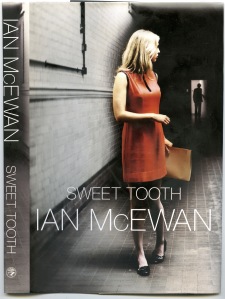 Aaron began redecorating our guest bathroom this morning. The wall-hanging cabinet was a typical piece of DIY from our predecessors in that the blue protective plastic film still adhered to the item, which had been secured by just two of the required screws. Aaron took it down, I painstakingly peeled off the film that felt as if it had been fixed with the spray mount I have been using on the garden album photographs.
Aaron began redecorating our guest bathroom this morning. The wall-hanging cabinet was a typical piece of DIY from our predecessors in that the blue protective plastic film still adhered to the item, which had been secured by just two of the required screws. Aaron took it down, I painstakingly peeled off the film that felt as if it had been fixed with the spray mount I have been using on the garden album photographs.
The sign on the back of the cabinet had been ignored.
Together, Jackie and I polished up the surfaces with Hob Brite.
The day’s warm weather was belied by the trees, tresses tossed, sashaying violently in the tempestuous winds of storm Clodagh, making it impossible for us to finish putting the rose garden to bed.
 ‘The Cement Garden’ from 1978 was, I think, the first of Ian McEwan’s novels I read. It introduced me to the author’s penchant for the gruesome. For that reason I have always been rather ambivalent about this excellent writer now surely at the height of his powers. His eloquent, smooth, prose is most compelling, but his tales often grim. Nevertheless ‘Sweet Tooth’, which I finished today, is difficult to put down. For some, the period of the Cold War and the energy-saving three-day week, may cause the work to be classified as historical. I, however, was entering my fourth decade in 1972. I can therefore vouch that McEwan brilliantly encapsulates the mood of the time.
‘The Cement Garden’ from 1978 was, I think, the first of Ian McEwan’s novels I read. It introduced me to the author’s penchant for the gruesome. For that reason I have always been rather ambivalent about this excellent writer now surely at the height of his powers. His eloquent, smooth, prose is most compelling, but his tales often grim. Nevertheless ‘Sweet Tooth’, which I finished today, is difficult to put down. For some, the period of the Cold War and the energy-saving three-day week, may cause the work to be classified as historical. I, however, was entering my fourth decade in 1972. I can therefore vouch that McEwan brilliantly encapsulates the mood of the time.
The work is not really a political or spy story. It is a love story which reflects the author’s often rather grim take on human relationships. The device of novels reported within the novel is intriguing, and cleverly done. Love him or hate him, McEwan is never boring, and always worth a read.
My one grouse is that the paper in this hardback, published by Jonathan Cape in 2012, is already turning brown.
I probably don’t need to explain The Cold War, but it may be helpful to quote Wikipedia on the three-day week, which ‘was one of several measures introduced in the United Kingdom by the Conservative Government 1970–1974 to conserve electricity, the generation of which was severely restricted owing to industrial action by coal miners. The effect was that from 1 January until 7 March 1974 commercial users of electricity were limited to three specified consecutive days’ consumption each week and prohibited from working longer hours on those days. Services deemed essential (e.g. hospitals, supermarkets and newspaper prints) were exempt.[1] Television companies were required to cease broadcasting at 10.30 pm during the crisis to conserve electricity.’
On 23rd September this year the Independent reported that: ‘The prospect of the three-day week returned to haunt Britain yesterday as it emerged that ministers are considering paying firms to cut hours in order to survive the recession’; and, as we near the end of 2015, trust between the East and the West is once more at a low ebb.
This evening we dined on one of Jackie’s more than just a Spanish omelette, stuffed with almost anything you could think of and topped with mature cheddar cheese. This was served with chips and baked beans, and followed by sticky toffee pudding and custard. I drank Seashore Isla Negra merlot 2014.



I’m not a McEwan fan Derrick – too pessimistic for me despite his sterling writing ability.The three day week sounds dreadful – one forgets these things so easily if they were not lived through. I hope it is not seen as a necessity again – the world is so much smaller now …….
Thank you, Pauline. I feel the same about McEwan, but good reviews can draw me back
That’s interesting. I had not heard of that three day week, even though I arrived in England a few years later in 1978. I knew, of course, of the union militancy, and Margaret Thatcher’s subsequent ascent severely curtailed my 5 year visa plans.
Thanks, Gwen. My memory is hazy, but I think the three-day week was quite short-lived
When I visited an aunt in Sicily in the late 70s, she kept her bathtub filled with tap water, as the supply was only turned on every second day. But I think the root cause was completely different from industrial disputes.
So young your wine, Derrick. About cold war… About the three-day week. Let me tell you a story Derrick. I know this story from my father. He stay in a russian model block. This block has no natural light inside. This means that the ladder of the block has light only from the light bulb. So, the story. When he was at my age, in the Ceausescu era, they used to have no electricity a lot of hours per day. 2-3 hours in the morning and another 2-3 hours at night. So, you realize that he have to use a flashlight to go upstairs to the last floor (8) where he lived? And all the other problems with the food from the refrigerator. And, also, the fact that when the nights were long, in the winter, they used to eat at a candle light. And so on.
Thank you, Monica. It was so much tougher for him and everyone over there
Dad told me he was too young to realize how tough it was. He and his friends used the darkness to have fun. But, still, there were bad times
I loved Sweet Tooth. I may even read it again, now that I know what happened. I don’t often do this but sometimes more is revealed when you know what to look for…a bit like in The Sense of an Ending by Julian Barnes.
Your area made the TV news tonight: I wondered if you had gone to photograph the sea!
Thanks, Jenny. I didn’t watch TV last night, ‘cos I was reading Sweet Tooth, but I can guess how rough the sea was, and have photographed it many times. We did discuss going down, but for once I didn’t fancy battling blindly for a picture. What was the news?
Milford on Sea showing the power of the ocean and the height of the waves over the promenade. Plus several towns in the south had had to cancel their Christmas lights switch on.
Thanks, Jenny. I clearly should have gone
PS. Wind still howling, trees still waving. Perhaps today
Jackie’s omelette is making my mouth water, Derrick. I love mounds of cheese!
Thank you, Jill
Ah revising by candlelight for my O levels. Thank you Arthur thank you Ted. As for McEwan… Self indulgently verbose. And Amsterdam a Booker winner? Really? A case, like Jacobson’s Finklers Question, a case of the committee deciding it was time they won rather the quality of the book. Sorry I seem to have hijacked your comments…
I liked Amsterdam. On the first page, I knew it was going to be very blackly funny, that nothing good was going to happen to the characters, and since they were such @#$#s, I wouldn’t care. I think it’s a masterpiece of dark humor. Now if that was his only sort of output, it wouldn’t be my taste…
And that’s what’s great about books; they can appeal or not and there’s always something else to like
Yes, thank goodness.
You’re probably right about the committee thing but if so they were right to decide that it was time…
We’ll have to agree to disagree Mary…
Thank you, Geoff
Sorry seem to have hijacked your comments, Derrick!
The more the merrier Geoff. I love it when I spark off conversations
I no longer have a need for novels. But I do like that omelette!
Thank you, Cynthia
I like Ian McEwan, although he is not my favourite writer. I am glad you had Jackie’s wonderful omelette to recover from the grim prospects of recession and three-day weeks 🙂
Thank you, Sylvie
I like McEwan. The first novel of his I read was The Child in Time. After that Black Dogs, Amsterdam (how often do you start a novel, know it is going to be filled with unlikable characters to whom nothing good is going to happen, and still want to read?), Saturday, The Children Act, and of course, Atonement. I liked them all except Atonement, which I wanted to throw against the wall, but it was too big. Suffice it to say, you’re right. McEwan’s early stuff was a bit grim and brutal and he can lean that way still, so it’s best to read the reviews and decide. Looking forward to more of your judicious reads!
Many thanks, Lisa, I still have unread McEwans. Maybe I’ll read another, soon.
I love everything in egg and egg in everything but I hardly ever buy them because six is the minimum one can buy and now that I’m sans oven…
Why no oven, Mary?
It died a few years ago and I didn’t bother to have it fixed or replaced.
🙁
It’s not so 🙁 – makes life simpler. When I feel I must make a cake I walk over to my friends’ house and use their oven.
Ah!
Oh – I feel so inadequate. I’m such a bad reader… And I haven’t heard of Ian McEwan. I thought he played Gandalf in “Lord of the Rings”? I haven’t got around to seeing it yet. But – the wonderful excitement in my life! – oh dear Derrick – after 40 years – I don’t exaggerate – the utterly unfathomable great-great grandmother has revealed in a hitherto unknown death notice in an ancient paper, that she was born in Devon in 1822. You’ve no idea my excitement (I’m not kidding) – that woman – Ann Nicholls – has been a mystery for 4 decades. I’ve searched Cornwall for her for the thousand years, but now… I’ve Devonshire blood coursing through my veins.
You seem to have opened up quite a debate about Ian McEwan, Derrick. Like you, I have to admire him, but he can certainly be grim, and I too am ambivalent. However, you’ve aroused my interest in this particular book.
Thank you, John
I first read McEwan when I was 17, Derrick. Definitely a writer I have such high respect for. Helped shaped my writing actually. Have you read On Chesil Beach? My absolute favourite. Saturday is also good. Sweet tooth, not as exciting for me :-))
That’s one I haven’t read, Nina. Thanks for the comment
Derrick, are you OK? No post today and you scare me. I hope you’re ok
Thank you, Monica. Just a bit late, for obvious reasons 🙂
We enjoyed Sweet Tooth much more than the latest one, The Children Act.
Thank you both
Terrific post! I agree that McEwan is grim—even pessimistic—but what a writer! And after all, isn’t life pretty grim at times?
Thank you, Laurie.